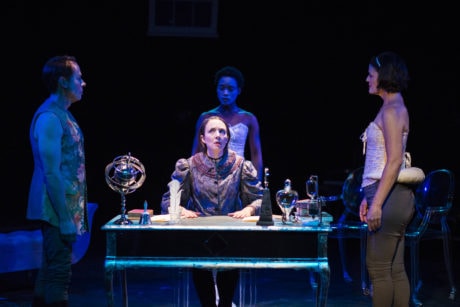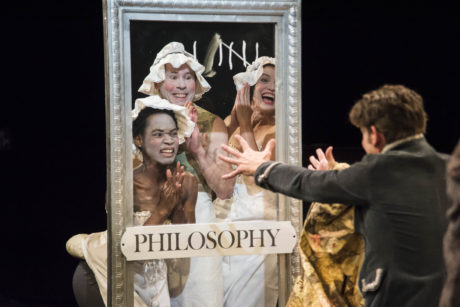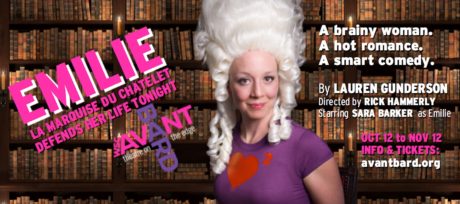Emilie Our Contemporary
Emilie du Châtelet, scientist, mathematician, lover of Voltaire, genius, is a perfect example of the power of women in the 18th century and today. Many of the challenges to women of the past are still with us: gender, racial, sexual preference, religious and ethnic discrimination. There is violence against women, sexual assault, and just plain bigotry which assumes women should be less and do less.
read Kendall Mostafavi’s review of this production here
Emilie resisted all that. She insisted on an education. She looked for tutors when she needed them. She even told the great Voltaire, the leading figure of the Enlightenment, when he was…let’s just say it…wrong.

And she did it in an era when most women in France couldn’t even sign their name in marriage registers. In the few schools available for women, courses in science, philosophy, even literature, were forbidden. In an amusing and painful scene in Emilie: La Marquise Du Châtelet Defends Her Life Tonight, the exhilarating new production at WSC Avant Bard, we see Emilie’s mother explaining the rules:
“A girl does not slouch, does not speak in excess, or laugh loudly attracting negative attention. Do not look your betters in the eye. Do not read in public.”
Her mother teaches Emilie the proper technique of fanning. Reminds her that the mouth should be closed while thinking. In short, she is schooled in the rules of the game for a woman of her class and time.

(Madam), Brit Herring (Voltaire). Photograph by DJ Corey Photography.
Emilie, when she met Voltaire, had achieved a “good” marriage, to the Marquis Florent-Claude du Châtelet-Lomont. He was a general for the King, and was often away. The pair had three children, and Emilie had already had several affairs. Her husband had them also. It was not unusual in 18th century aristocratic circles for married couples to have affairs, provided they were conducted with discretion. And she was bored to tears.
Voltaire, wit, playwright and philosopher, was often in trouble for his critiques of the government and the Catholic church. She and Voltaire fell passionately in love, although he was in danger of arrest, for writing Lettres philosophiques, which had been printed without his permission. These letters, written in exile, praised the freedom of speech and religion in Britain as opposed to France. Censors viewed the letters as criticism of the King and the Church. A lettre de cachet was issued for Voltaire’s arrest, and he could have ended up in the Bastille had he not fled with Emilie to her chateau in Cirey, where they began their long partnership.
The play is delightfully witty, and produced with great energy and style. Act One focuses on a joint project of the lovers. The Academy of Science is sponsoring a contest about the nature and propagation of fire. Emilie and Voltaire work on it together, fiercely disagree, and ultimately submit separately. Later, Emilie argues with her daughter, who, as it turns out, did not want the conventional life her mother arranged for her. In Act Two, there are betrayals, intellectual and otherwise, and Emilie’s life takes some unexpected turns.
Sara Barker is the perfect Emilie: attractive, emotional, and intelligent to the nth degree. As Voltaire, Brit Herring relishes his sparkling chemistry with Emilie. Billie Krishawn is charming as the Soubrette, who stands in for the young Emilie and later for her daughter. Lisa Hodsoll’s Madam, as the stuffy Madame Graffigny among others, and Steve Lebens, as Emilie’s preternaturally tolerant husband (and one of her lovers), are excellent.
The physical aspects of the piece are striking and perpetually in motion, reflecting the effervescence of their lives (Set and Properties Designer is Greg Stevens). Lighting Designer Joseph R. Walls contributes some lively electrical effects, which I don’t want to spoil by detailing. Costume Designer Danielle Preston has created costumes with both modern and period elements, which synthesize beautifully. Sound Designer Frank DiSalvo Jr.’s work is equally effective.
Director Rick Hammerly follows up the magnificent Lela & Co. with another winning production featuring an unconventional heroine. Emilie and Voltaire lived in a culture that would be considered backward today. Women could be beaten, even publicly, by their husbands. Censorship was omnipresent, and there was no such thing as a private religious belief. Aristocrats often paid no tax at all. Emilie and Voltaire, as champions of the Enlightenment, stood against religious fanaticism and in favor of tolerance and the search for truth. They lived an authentic life rather than one paralyzed by convention.
As for Emilie, she translated and wrote commentary for Isaac Newton’s book, Principia, which contained the basic laws of physics. Her translation is still the authoritative French version. She gained recognition in a scientific world which was thought to be for males only.
She argued for what she believed, even if it caused her personal and professional suffering. In a time when women’s rights are in danger again, she is a trailblazer who can inspire us all.
Running Time: Two hours, with one 15-minute intermission.
Emilie: La Marquise Du Châtelet Defends Her Life Tonight plays through November 12, 2017, at Avant Bard performing at Gunston Arts Center, Theatre Two – 2700 South Lang Street, in Arlington, VA. For tickets, call the box office at (703) 418-4808, or purchase them online.
VIDEO:





